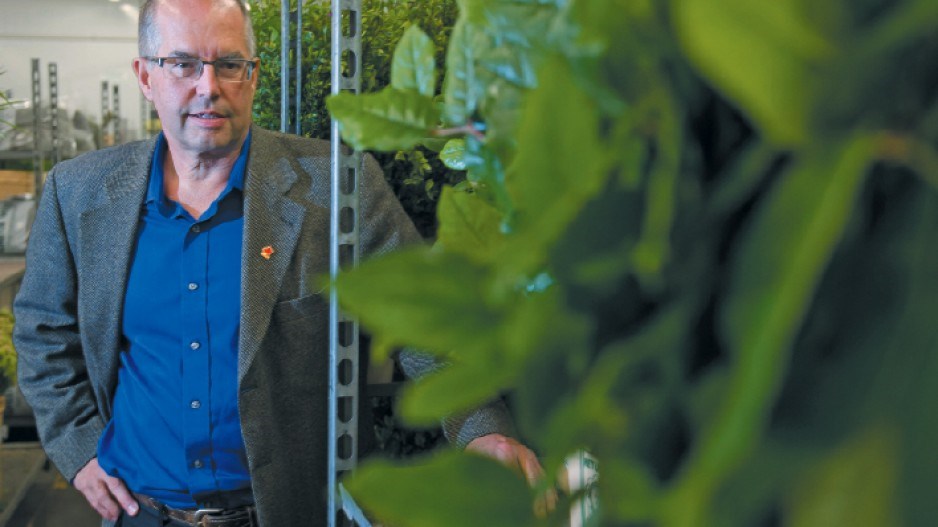Whether it's in the forest or in the supermarket floral section, it’s easy to overlook salal – an evergreen shrub that grows throughout the Pacific Northwest. It’s a filler – used by florists to structure arrangements and offset the colourful parts of bouquets. But ask someone like Mike Stubbs, who has bought salal for 25 years from pickers on Vancouver Island, and the discussion about this seemingly unremarkable plant can get heated.
“Some [harvesters] just destroy the plant,” said Stubbs, who owns the Saanichton-based Mount Newton Floral Wholesale. “They don’t care about next year. They’re in for a quick buck.”
In August, those pickers return to the woods after a break in the nine-month harvesting season. The harvest is one of the most visible parts of a long-simmering debate over the use of B.C.’s non-timber forest products.
Tom Hobby, CEO of SCR Management, calls the northwest trade “an $80 million to $100 million a year industry that no one hears about.”
Those are estimates. Picking and selling salal, along with pine mushrooms, berries and other greenery, is not regulated by the province. There are no permits for harvesting on Crown land, no fees or limits on cuts. Someone who cuts a tree on public land and sells it can be prosecuted – not so for resources like salal.
Some people think that’s a problem.
“It’s a legitimate industry,” said Wendy Cocksedge, an ethnobotanist who researched at Victoria’s Royal Roads University. “But people look at it as a black market.”
First Nations have long valued salal for its edible berries. It wasn’t until the 1950s that florists realized the plant’s commercial potential.
Salal’s thick, waxy leaves stay green months after being cut, making it ideal for shipping in refrigerated containers. A 2010 study Hobby co-authored pegged the annual value of salal from southern Vancouver Island – around a quarter of the provincial total – at between $6.5 million and $10.5 million. Most of that ends up in flower markets in the Netherlands.
For some, salal harvesting is a quick buck between seasonal work. Others have few options.
“There’s a sizable contingent of new immigrants,” said Tim Brigham, another Royal Roads researcher.
Others are “free spirits” who like living close to the land. Hobby said there are probably a few hundred who harvest commercial volumes and can make around $30,000 a season.
“It’s a lot of people in pickup trucks, working off the beaten track, with an incredible amount of cash,” said Cocksedge.
That combination has at times been explosive. In the 1980s, during a boom in the Japanese economy, demand for edible pine mushrooms pushed prices through the roof. That spawned turf wars, and across the industry, things got ugly.
“I heard of one fellow who was tied to a tree for two days,” said Cocksedge. “The buyers were frequently robbed when there was a lot of cash, so they’d sit up all night with their shotguns.”
Fear that the industry might be tied to criminal activity led the RCMP in 1998 to issue a report, “The Need to Regulate Botanical Forest Products in British Columbia.”
But more recent calls for regulation are focused on defusing less extreme tensions.
For one, salal pickers and loggers often run afoul of one another. Some timber companies allow harvesters onto their land for a small fee. But many logging operations destroy salal, a fast-growing competitor with young saplings, and there is little harvesters can do. And while salal is abundant on northern Vancouver Island, the forest is thinning out in heavily harvested areas near Comox, Duncan and Port Alberni. That means shorter salal, which in turn means less income.
Under a managed system, Hobby said, “people harvesting can make more money over time having a better quality product.”
But Brigham said it’s difficult to convince many of those involved that regulation is worthwhile.
“Even if [the province] wanted to regulate, there’s no money in it for them,” said Stubbs. “There are thousands and thousands of square kilometres on Vancouver Island. They’ll catch a few guys, and that’s about it.”
The Ministry of Forests confirmed to Business in Vancouver that since the harvest of non-timber forest products leaves a small environmental footprint, the government sees no reason to get involved. •



